The World's Most Terrible Alarm Clock And Other Intentionally Uncomfortable And Hilarious Objects
by Emma Whitford
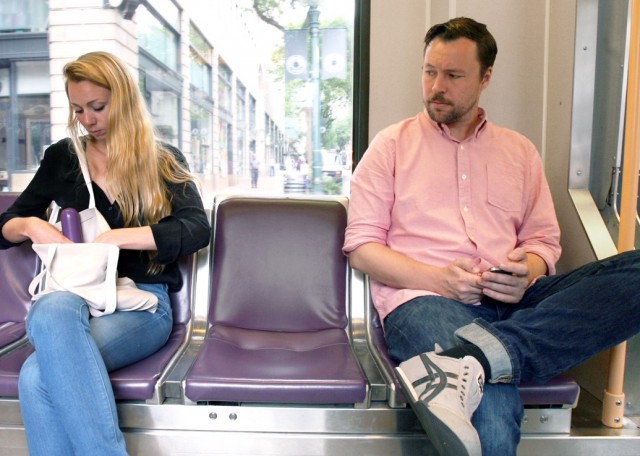
When Lydia Cambron was tasked with interpreting the word ‘ruffle’ for a group show at Portland’s White Box Gallery this summer, she started thinking about daily disruptions. Outside of the tech world, disruptions usually have negative connotations — a flat tire, a stain on a white shirt, a smashed iPhone case. But Cambron, a Portland-based industrial designer, prefers to think of these disruptive ruffles as beneficial. She believes that being aggravated, pained even, can force us to address our more deep-seated anxieties and insecurities. Once you can wrap your head around accepting, and even appreciating, discomfort, imagine three products that facilitate it. That’s the idea behind Twice Daily, Cambron’s three-pronged conceptual project.
• The Personal Weight is an eight-pound purple cylinder reminiscent of a sex toy, which adds extra weight to a backpack or purse. (It’s phallic enough that you’d think twice before taking it out in public).
• The Obstacle/Alarm Clock is a clock tethered to an inflatable, transparent tube. When the alarm goes off, the only way to silence it is to pump the tube full of air. This slowly deflates over the course of a day, all the while forcing anyone in the vicinity to navigate around it.
• Itchy Accessory is a suspenders-like garment worn under clothes that gives the wearer a private itch.
I talked with Cambron, and she explained why she felt compelled to create three distinctly uncomfortable objects.
So each of the three objects — the weight, the alarm clock, the itchy garment — symbolizes a behavior.
Right. The weight is all of the anxiety that is weighing you down, until it gets so heavy that you’re like, ‘Well, fuck it! Why am I carrying this around anymore?’ Then the alarm clock is the bad behaviors that implicate your family and friends. They are inhibiting, but they are so tethered to your daily routine that you don’t bother trying to pluck them out. And then with the garment, you’ve got this itchy thing that looks like an undergarment — something that’s part of your daily routine of getting dressed. It’s like those secret securities that we adopt, not realizing that they do more harm than good.
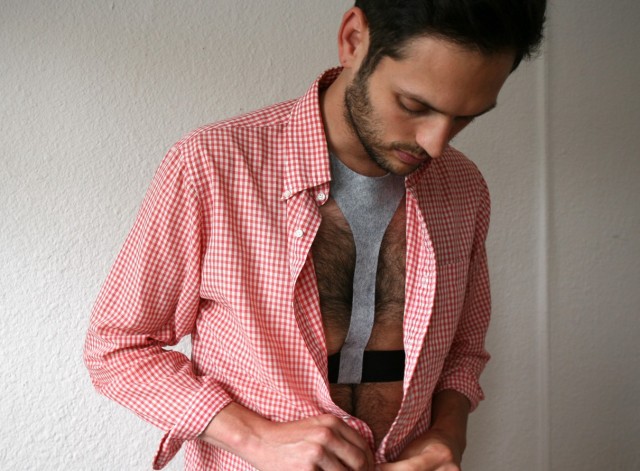
What’s an example of a security that does more harm than good?
The most basic I can think of is putting on a bunch of makeup in the morning. You do it because you think that you need to. But really it’s like, no — you’re just kind of dependent on it. And when it’s not just right, you’re uncomfortable. But you’re not noticing the damage that it’s really doing. You think of it as a sort of security that you need.
There must have been other products that occurred to you, before you settled on these three.
Oh yeah. Some of the other ones I had were like, ‘Oh, maybe there could be a cinderblock that you would keep on the side of your bed.’ Every morning, you would stub your toe on it. And then I thought about having conductive tape that you would put in your doorway. It would give you a little zap if you touched it. You’d forget that it was there, and get zapped.
Wow.
Yeah. They’re jarring. Another one was a machine that would just continuously blow up a balloon. But the rate was always different, so at some point it would pop. And you would never know exactly when.
That’s so anxiety-inducing.
Yup.
You really like things that are unpleasant.
I’m interested in uncomfortable and embarrassing behaviors. They’re so relatable! But because they are unpleasant, we tend to shy away from them, or assume that they need to be hidden. I think that by looking straight at these behaviors, by trying to understand them, we can learn a lot about ourselves.
Phallus aside, Twice Daily seems to be more about discomfort than embarrassment. What inspired you to hone in on the former?
I had recently heard an interview with James Murphy from LCD Soundsystem on “Fresh Air.” He talked about turning up the volume at his shows to a level that isn’t damaging, but is loud enough to create this really intense visceral experience.
Intense in a good way?
I like the idea of taking something that is a negative, or seen as a negative, and turning it into a positive by jacking it up to a certain level. When we have life-changing moments, they’re usually spurred by some sort of intense event, that in hindsight you’re like, ‘Oh, well, that was a good thing.’ Or, ‘I’m glad that happened.’ But while it’s happening, it’s really shitty.
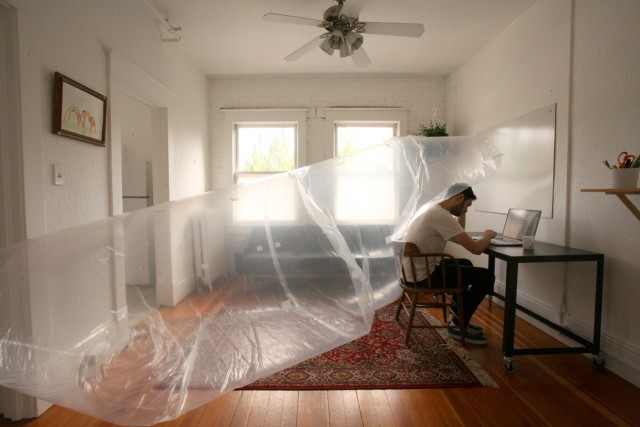
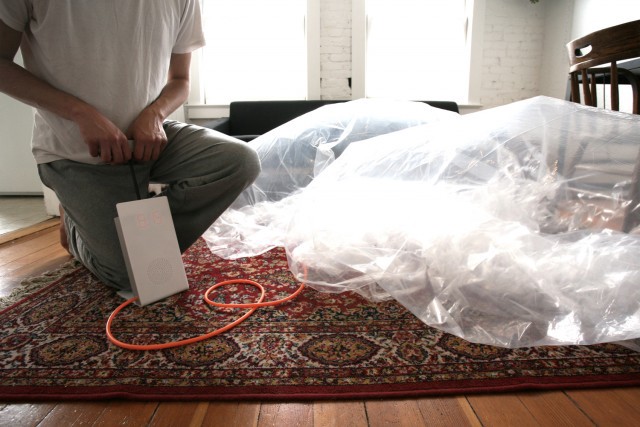
So this is one way to spur those moments.
Yeah. I got interested in trying to commodify that disruption. Because I obviously can’t create someone else’s life-changing experience. That has to come from within. What I could do was create little things that make you uncomfortable. If you’re already upset and you can’t find your keys, that can spark something. You start bawling. Then you’re like ‘Oh, okay, I’m actually really upset about this other thing.’
What types of other things?
Maybe the negative opinions you have of yourself, or the fact that you’re stubbornly holding on to a harmful relationship. Twice Daily pushes you out the door before you’re finished getting dressed. Like, ‘Sorry! Here you go! Now just deal with it.’
Did you feel the need to test out a lot of different scenarios while you were developing the project?
No, I decided on all three objects at the sketch level. With my final picks, I knew what they might feel like. They’re not too foreign. The balloon and the tape were a little too weird.
Now that you mention it, I can imagine seeing the products in Twice Daily on the shelf in Duane Reade. They all have familiar elements.
I wanted all of the objects to look at least kind of unassuming, and even a little desirable. So they don’t recall a strange medical device, like a knee brace. I like that they look appealing, but then actually do that thing that’s really uncomfortable.
I keep thinking of that scene in Monty Python and the Holy Grail when the monks hit themselves on the forehead with wooden boards. Do you remember that scene?
Ha, no! It’s been a while.
My knowledge of what they are parodying is definitely minimal. But is it possible that you were inspired by religious flagellation?
I haven’t actually thought about that. This is a fairly intuitive and personal project. But I do like that idea of administering something that you know is going to be difficult. You do it because you see this ultimate gain. When I was working on the project, someone told me about this 30-day cold shower challenge.
Oh yeesh.
Some guy did a TED talk about it. It’s like, if you can handle five minutes of being uncomfortable, alone, then you’re good. And if you can’t, then you’ve got bigger problems.
This sort of stuff clearly has purchase in our society. What has the feedback to Twice Daily been like? Do people seem to get it?
It gets a lot of laughs. And that’s intentional. I like to start things off with humor, and from there, get into that deeper conversation. I like to think of humor as a Trojan horse. On the outside it’s very palatable. It’s quick and easy. You’re immediately engaged. And then you start to read into it.
Imagine that you’ve been tasked with actually getting Twice Daily on the market. Can you think of a part of the country, or even the world, where you might find some interested buyers?
I guess anywhere that life is okay enough that people are trying to be introspective. I mean, Twice Daily is sort of similar to meditation retreats and diet pills. People want life-changing experiences, and moments of clarity. Imagine if people decided that there was value in personal disruption. Then the market would immediately go up for a commodified version of it.
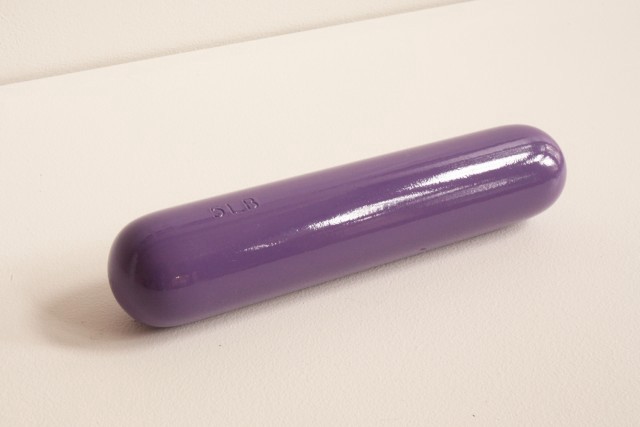
I’ve been meaning to ask where the name comes from.
Well, I like that it sounds sort of medical. In my original presentation, the caption was, ‘Prescribe Disruption.’ It’s the idea that these products are something you’re using to get better, like vitamins. The full title is actually Twice Daily and Continue as Needed.
Oh!
It’s like reading a prescription bottle. Here are the instructions, here’s what you do. Call me in a week.
What prescription of Twice Daily would you give yourself?
I would try all three. But when you stop taking cream or sugar in your coffee, at first it’s like, ‘Ah! This is gross!’ and then you get used to it, and you don’t want to go back. So I worry that I would just adapt to them.
So maybe you could switch from one to another. Once the effect of one wears off, you can try the next?
No, I would totally try them all at the same time. I mean, I’ve been doing the cold shower thing, and I love it. Intense immersion — that’s my strategy.
Emma Whitford is an editorial assistant at New York magazine. She also enjoys reviewing fiction for Publishers Weekly. She is, deeply, a New Englander. This interview has been lightly edited.
